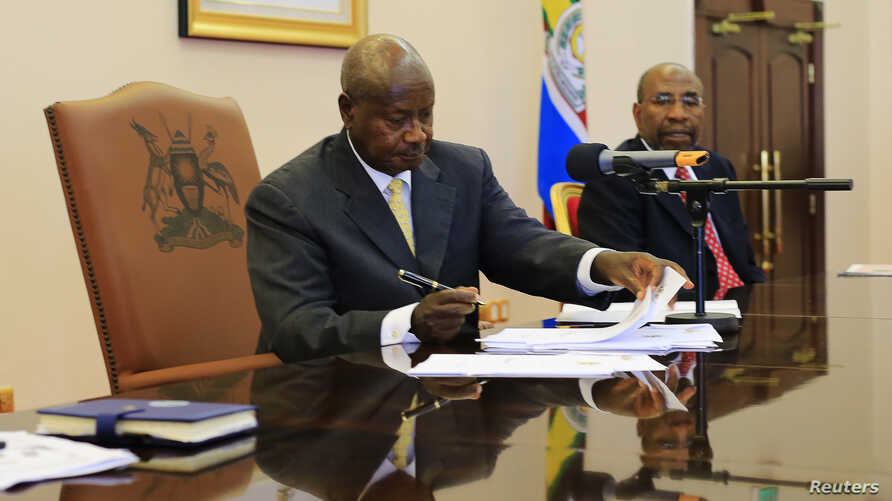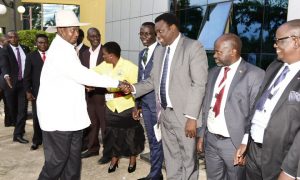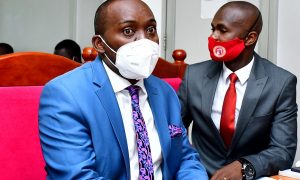
The Minister of Justice and Constitutional Affairs, Prof Ephraim Kamuntu has tabled regulations that will restrict political party activities and propose unique methods for election of party officials in light of the Covid19 pandemic.
The Political Parties and Organisations (Conduct of Meetings and Elections) Regulations 2020 seeks to “enable a political party or organisation to elect leaders and sponsor candidates for nomination for general elections without compromising the health and safety of its members or the public.”
It also seeks to provide a new legal regime to aid political parties to elect leaders and sponsor candidates for nomination for general elections within the limitations imposed by the Public Health Act and other restrictions to contain the spread of Covid19.
Regulation 5(2) proposes other arrangements for meetings of political parties to include virtual meetings, resolutions by circulation, phased elections and open ballot.
It also includes election by Electoral College and physical meeting of party officials as long as they conform to the Covid19 social distancing rules, an exception which only applies to a restricted number of party officials.
To aid the application of these interventions, Regulation 5(3) overrides political parties’ constitutions and empowers Executive Committees to employ a combination of these methods in arriving at candidates to present for election of new party officials.
Holders of political party offices other than the Executive Committee of political parties will have their terms extended by six months at a time, should the Covid19 pandemic persist beyond the time prescribed.
The regulations define an Executive Committee as the governing body of political parties by whatever name called.
The Regulations, if passed, could see party candidates elected by selected party officials as opposed to universal suffrage to avoid the spread of Covid19.
Speaker Rebecca Kadaga referred the Regulations, brought under the Political Parties and Organisations Act to the Committee on Legal and Parliamentary Affairs for further scrutiny within one week.
Electoral laws
President Museveni has, according to Minister Kamuntu, assented to Parliamentary Elections (Amendment) Act 2020, the Electoral Commission (Amendment) Act 2020 and the Presidential Elections (Amendment) Act 2020.
The President has, however, returned the Local Government (Amendment) Act 2020, with the contentious clause said to be the creation of district woman councilors for every town council or sub-ounty as opposed to the current arrangement where a councilor represents two or more sub-counties.
INITIAL BILL
The Presidential Elections Amendment Bill 2019:
Clause 3 was deleted. It proposed that a person is only eligible to stand for election as an independent candidate if that person is not a member of a registered political party or organization, having ceased to be a member of a political party or organisation before nomination day, having had his or her membership of a political party or organisation terminated before the nomination day or having never been registered as a member of a political party or organization.
Clause 6 was deleted. This proposed prohibition of Presidential candidates from receiving funding from a foreign government.
Clause 13 was also deleted; this clause was intended to bar the President from giving donations during election period.
Parliamentary Elections Amendment Bill, 2019:
The clauses that provided for the eligibility of candidates, similar to those deleted in the Presidential Elections Amendment Bill, were also deleted from the Parliamentary Elections Bill and the subsequent bills.
Clause 1 was amended to provide that where a new district or constituency is created after the general parliamentary elections, the elections to fill the vacant elective position for the district or constituency Member of Parliament shall be held at the next general parliamentary elections.
The nomination fee for the candidates for Parliamentary Elections was maintained at 3,000,000 Uganda shillings.
The Electoral Commission Amendment Bill, 2019:
The amendment provides for electronic display of election results for the candidates during the tallying process to ensure transparency of the process.
According to this new law, in case of an electoral petition and it is found that the Electoral Returning Officer is personally responsible for the irregularities, he/she is liable to pay a proportion of the compensation. This serves as punishment for returning officers who get involved in election malpractice.
The Local Governments Amendment Bill, 2019:
The amendment provides that the in a situation where a new Local Government or administrative unit is created after the local Government council elections, the elections to fill the elective positions in the newly created local Governments or administrative unit shall be held at the next Local Government Council elections.
Clause 7 was amended setting the minimum qualifications for Sub-County Chairpersons at O’Level. The Mayors of Cities, Municipalities and Divisions are also expected to meet this requirement. Only the Councilors were exempted from these requirements with the new amendment.
The Political Parties and Organisations Amendment Bill, 2019:
With this amendment, each political party is responsible for the code of conduct of its candidates’ supporters during the electoral processes.
In this law, members of Political parties their supporters will be banned from intimidating, disrupting meetings or rallies of any member or supporter of the person affiliated to other parties and organizations.




























